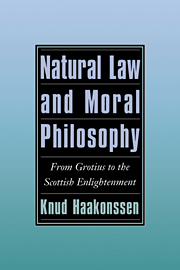Book contents
- Frontmatter
- Contents
- Acknowledgements
- Introduction: The Scottish Enlightenment in the history of ideas
- 1 Natural law in the seventeenth century
- 2 Natural law and moral realism: The civic humanist synthesis in Francis Hutcheson and George Turnbull
- 3 Between superstition and enthusiasm: David Hume's theory of justice, government, and politics
- 4 Adam Smith out of context: His theory of rights in Prussian perspective
- 5 John Millar and the science of a legislator
- 6 Thomas Reid's moral and political philosophy
- 7 Dugald Stewart and the science of a legislator
- 8 The science of a legislator in James Mackintosh's moral philosophy
- 9 James Mill and Scottish moral philosophy
- 10 From natural law to the rights of man: A European perspective on American debates
- Bibliography
- Index
6 - Thomas Reid's moral and political philosophy
Published online by Cambridge University Press: 05 June 2012
- Frontmatter
- Contents
- Acknowledgements
- Introduction: The Scottish Enlightenment in the history of ideas
- 1 Natural law in the seventeenth century
- 2 Natural law and moral realism: The civic humanist synthesis in Francis Hutcheson and George Turnbull
- 3 Between superstition and enthusiasm: David Hume's theory of justice, government, and politics
- 4 Adam Smith out of context: His theory of rights in Prussian perspective
- 5 John Millar and the science of a legislator
- 6 Thomas Reid's moral and political philosophy
- 7 Dugald Stewart and the science of a legislator
- 8 The science of a legislator in James Mackintosh's moral philosophy
- 9 James Mill and Scottish moral philosophy
- 10 From natural law to the rights of man: A European perspective on American debates
- Bibliography
- Index
Summary
Thomas Reid is well known as an epistemologist, and to the extent that his moral philosophy has attracted attention, it has, until recently, concentrated on his idea of moral agency and moral judgement. The publication of his manuscript material on ‘practical ethics’, of which natural jurisprudence was the most prominent part, has enabled us to add significantly to this agenda. The concern here is not, however, simply to add but to integrate. I want to show that Reid's practical ethics actually forms an integral part of his philosophy.
Human knowledge
Given Reid's presuppositions, the argumentative coherence of his moral thought is tight and systematic. The cardinal themes are the possibility of knowledge and, deriving from this, the possibilities in knowledge. The philosophy of mind shows what knowledge, including moral knowledge, is possible for man, and practical ethics shows what possibilities this gives man as moral agent. The basic presuppositions are theological and may be characterized as ‘providential naturalism’, a term that is appropriate also for George Turnbull and Lord Kames, Reid's principal mentors along with Butler in this regard. For Reid – as for Turnbull, Kames, Butler, and most of their contemporaries – the world in both its material and immaterial aspects was a well-organized whole whose parts by their coherence indicated an intelligent, purposeful mastermind. The existence within creation of the human mind, with its apparent cognitive powers, thus gave rise to the presumption that the purpose of the mind is to explore the created world as it is presented to these powers.
- Type
- Chapter
- Information
- Natural Law and Moral PhilosophyFrom Grotius to the Scottish Enlightenment, pp. 182 - 225Publisher: Cambridge University PressPrint publication year: 1996



